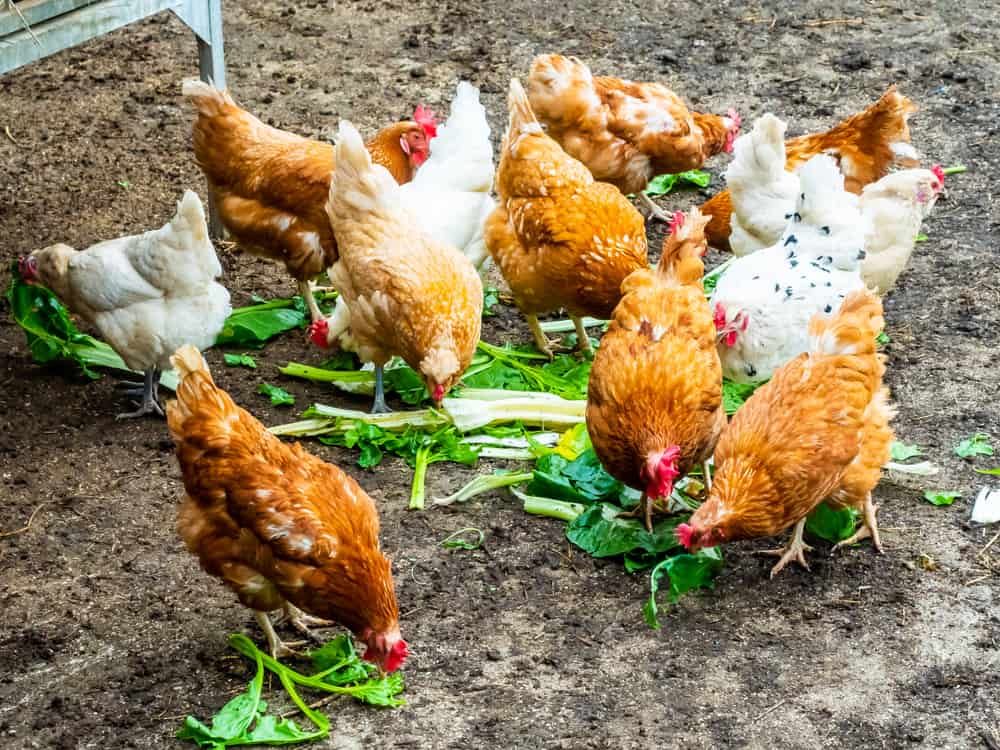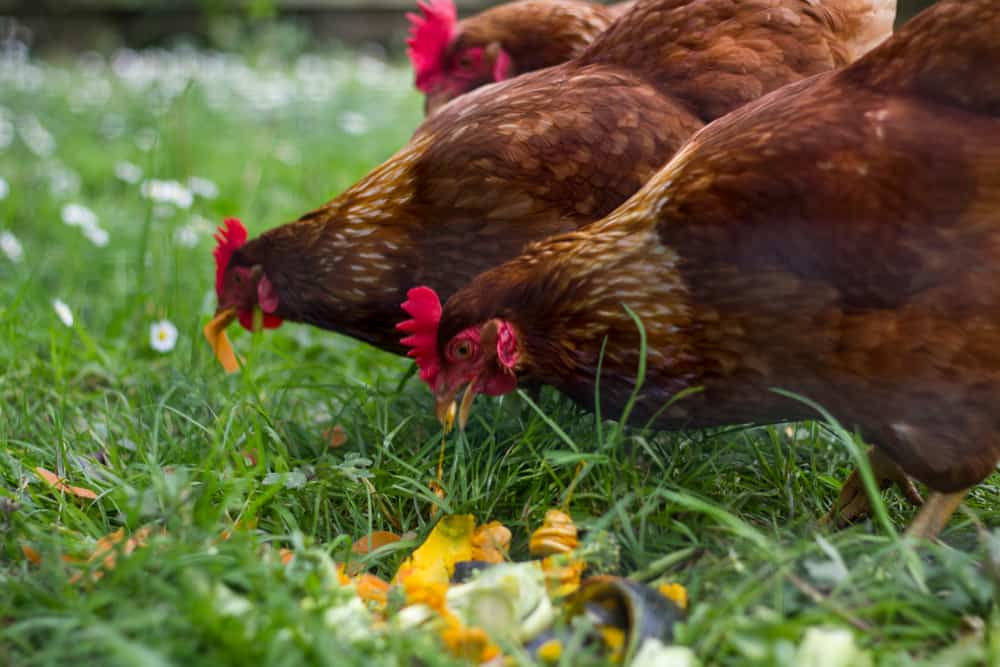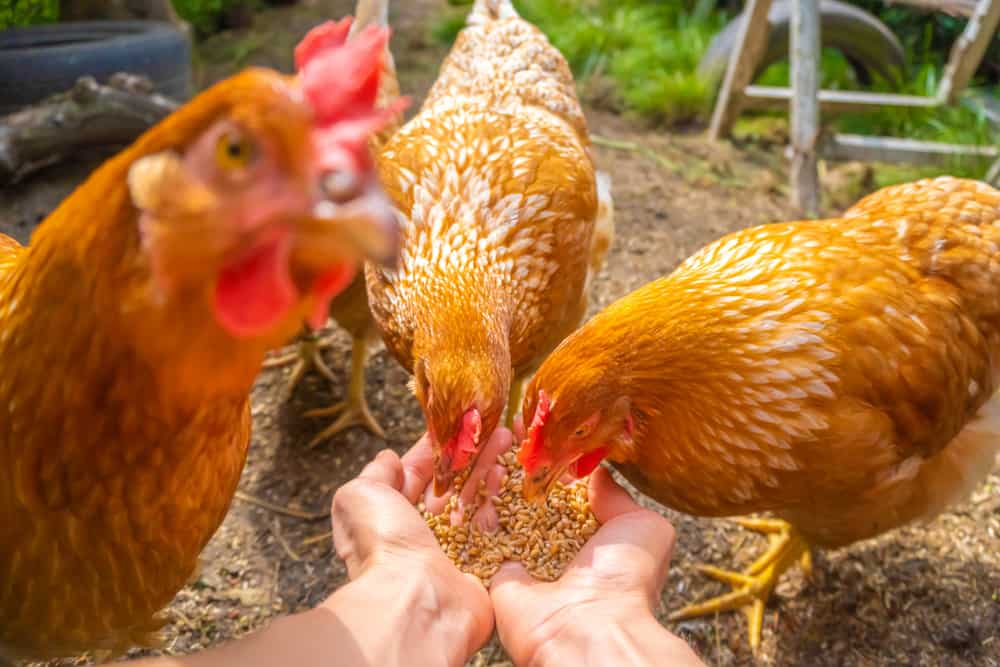Chickens are the most domesticated creatures in the world. Chicken is everywhere, on tv, company logos, in villages, in factories, on your dinner plate, you name it.
They are known for their delicious eggs and mouth-watering meat. But the question is, what do chickens eat themselves? Let’s find out.
Chicken Habits And Biology
Gallus gallus domesticus, chooks, or simply chicken as its commonly known, is the most domesticated animal globally.
Chickens live together in flocks and have a rigid social structure known as the ‘pecking order.’
The pecking order determines how chickens are allowed to access water, bathing areas, and food. The most dominant member is also considered an expert in sniffing out food sources.
Chickens’ bodies are well equipped and adapted for their feeding habits, from beaks to their toes and digestive systems.
They have developed short, intense, pointed beaks throughout centuries of adaptation that allow them to pick up seeds, fruits, and even insects from the ground.
Their feet are claw-like that are used to scratch the earth in search of insects and grub. Occasionally, it can be used to hold on to tiny prey animals such as lizards, mice, and small snakes.
Chooks digestive system is simple, short, and efficient. Digestion begins as soon as the food is taken in through the mouth.
Chickens have tactile cells in their mouths that help decide whether the bird will accept or reject the food.
The food is then stored in the crop, a pouch formed to serve as a storage area before the food is passed down to the gizzard for further digestion.
The gizzard contains powerful muscles that rhythmically contract to reduce the thickness of the food content. The birds swallow small rocks or soil particles to aid in grinding food into small pieces.
The actual stomach of a bird is known as the proventriculus. This organ contains hydrochloric acid and the enzyme pepsin that is secreted to aid digestion.
Chicken, if well cared for, may live for five to ten years. Did you know? The eldest chicken ever lived for sixteen years of age, according to the Guinness World Records?
Do Chickens Eat Dirt?
You may have come across chooks eating dirt and wondered if it’s normal. Yes, they do eat dirt. As discusses previously, they swallow soil particles or grit to aid in the breakdown of food material in the gizzard.
You may have also come across chickens eating other forms of dirt. While foraging, they tend to wander and poke about dogs or other animal droppings, including their own. Disgusting? Definitely.
That’s why it’s vital to carry out worming regularly amongst your poultry. In turn, this will rid your birds of unwanted intestinal pests and keep them in good health.
What Do Chickens Eat Most?
Chicken’s are classified as omnivores and are foragers by nature. The diet consists of a broad range of foods. You might confuse them for herbivores when you find them feeding on pasture.
The foods in chooks diets are:
- Broccoli –is high in several vitamins and low in fat.
- Asparagus –are rich in vitamins and are a good source of fiber should be fed to chooks sparingly as they may affect the taste of eggs.
- Crickets –contain protein, fat, carbohydrates, and numerous minerals and trace elements. Crickets should be fed in moderation.
- Bread –though enjoyed by chicken should be fed in moderation due to its high-fat content.
- Cabbage –is healthy as it contains a lot of vitamins required for the healthy development of the chicken.
- Popcorn –is rich in
- Cucumbers –are rich in vitamins and also contain anti-inflammatory agents. They are best fed to chooks on a hot day.
- Cooked rice –is rich in carbohydrates that are a staple food in poultry diets.
- Pumpkin seeds –are said to rid chooks of worms
- Meat and bonemeal are rich in potassium, calcium, and proteins required for egg development.
- Cheese –is a good source of calcium and protein.
- Peaches –are highly nutritious, but seeds should be removed as they contain cyanide.
- Kales –are healthy for chicken as they are rich in vitamins. They can be fed to chicken either raw or cooked.
- Mealworms –are rich in protein and can be fed to poultry either fresh or dry.
- Eggs –are rich in protein. Preferably, eggs should be boiled or scrambled to prevent the chickens from eating their eggs.
- Bell peppers –are also eaten by chickens but only the fruits and not the leaves or flowers as they can be poisonous.
- Green beans –are a high source of nutrients but should only be fed to the birds when cooked.
- Nuts –contain a lot of saturated fats and should be given In moderation and unsalted.
- Oats –are high in vitamins and some protein and could be fed to chooks while hot or cold.
- Zucchini –is known to assist in worming poultry
- Beans –should only be fed to chooks when cooked as raw beans contain harmful toxins.
- Pumpkin seeds –assist in worming poultry.
- Strawberries –are high in vitamin C, B9, and antioxidants.
- Pet food- dog and cat food are high in fats.
- Oatmeal- is rich in fiber and other nutrients.
- Bananas- contain potassium.
- Grapes- contain vitamins.
- Blueberries- are rich in cancer-preventing nutrients.
- Sunflower seeds- contain fats, oils, and protein.
Water is also a crucial requirement in the diet of poultry. It transports nutrients from the digestive tract to the cells. It also carries away waste products.
Chooks eat almost everything, about a hundred different types of food, possibly more. Each food contains crucial nutrients.
Foods To Avoid Feeding Chickens
Chickens, like many other animals and birds alike, are susceptible to diseases.
These problems range from diarrhea, intestinal worms, heart problems, seizures, and even death. It is essential to take note of what your chooks eat and carry out worming regularly.
Several foods are considered harmful or toxic to poultry.
Foods you should avoid feeding your chickens are:
- Moldy or rotten foods -fungus contains neurotoxins that cause these birds’ vomiting, seizures, and diarrhea.
- Dry beans –contain a substance, lectin, that causes gastrointestinal problems in poultry. Cooked beans, on the other hand, are acceptable for consumption.
- Green potatoes –contain solanine that causes heart problems, difficulty breathing, and gastrointestinal issues.
- Citrus –either fruits or juices may lead to trembling, weakness, hypothermia, or low blood pressure in poultry.
- Avocados –contain a compound called persin, which would be toxic to your birds. They lead to problems such as vomiting and diarrhea.
- Chocolates and candy –contain theobromine that is toxic to many animals, including poultry. Theobromine causes seizures and may lead to death.
- Onions -high intake of onions by poultry may cause anemia and ultimately lead to death.
- Garlic –high intake of garlic may affect the taste of chickens’ eggs and can also be poisonous to the birds.
- Tomato leaves –contain solanine that leads to heart complications, difficulty breathing, and gastrointestinal problems.
- Toads –secrete a poisonous venous that can prove to be harmful to poultry if consumed.
- Mushrooms –some species of mushrooms may prove to be poisonous and unsafe for poultry consumption.
- Lupine –contains quinolizidine alkaloids that cause nervousness, depression, muscle twitching, aimless wandering, and causes convulsions in chickens.
Again, remember to keep watch of your chickens and be aware of what you feed them to keep them healthy.
Tips To Feeding Chickens
Whether keeping chooks for meat, eggs, or pets, it is vital to care for them correctly. A proper feeding habit should be your primary concern.
The below are steps to care for your chooks properly:
- Ensure you measure how much your chooks eat. Make sure they have enough access to food all day. On average, a single hen consumes 120g of food per day.
- The more scraps you give them, the less they eat. Ensure you measure how many leftovers you give them and take notes.
- If you are out of food for the day, make sure to feed them more the next day.
- Ensure fresh, clean, and cool water is available at all times. Water is vital, especially when feeding. It helps them soften their food to kick start the digestion process.
- About 400ml of water is consumed on average by a single hen per day.
- Begin by feeding them early in the morning, then followed by another meal late in the afternoon.
- Regular feeding allows you to monitor the chooks eating habits. Therefore, when they don’t eat, it should be a point of concern.
- Minimize the amount of competition your chickens face when they feed.
- The greater the number of chickens you have, the greater the competition. Get an additional feeder if all your chickens dine at the same time.
- Worm your chickens occasionally. Worming should be carried out once every three months.
- Over long periods, use different wormers as worms tend to build resistance. Seek guidance from your local vet on the choice of wormers to use.
- Treat your chooks to bugs every once in a while to supplement their feed.
- Ensure to feed them only chickens feed.
- Chickens’ feeds are medicated to prevent diseases.
No doubt, if you follow the steps above, your chooks will live long and produce healthy eggs.
Summary
It’s clear to see that chickens’ diet is extensive. For their growth and development, it is essential to be informed of their dietary needs. Caring for them may seem easy, but clearly, it takes a little work.
If you are want to keep chicken for eggs, meat, or even as a pet, buckle up.


